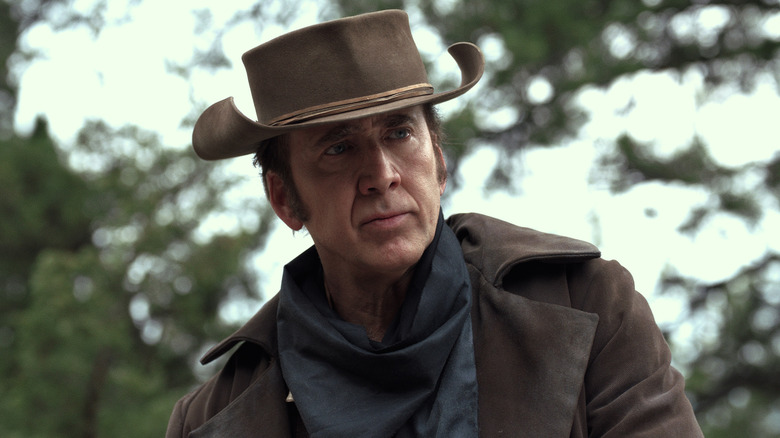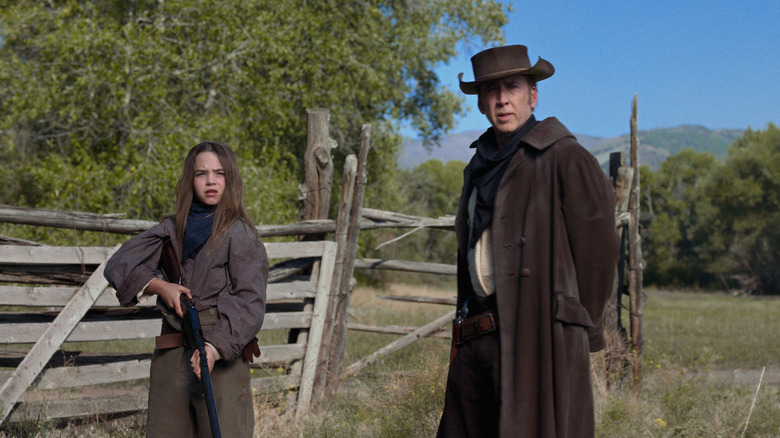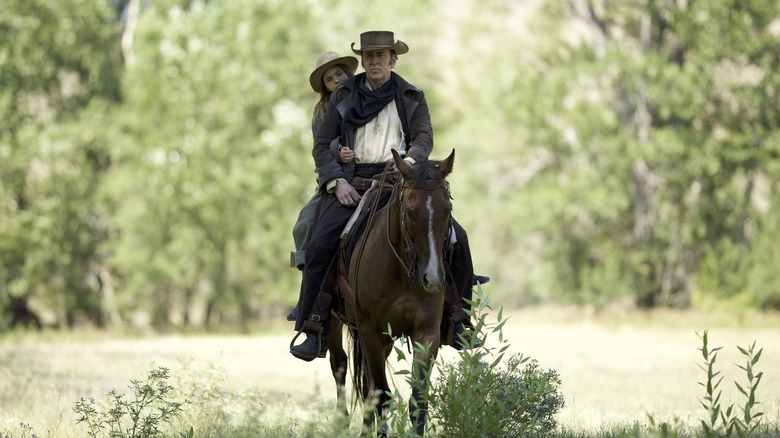Nicolas Cage On The Old Way And Looking To Charles Bronson For Inspiration [Exclusive Interview]
Nicolas Cage's acting career spans 41 years and over 100 movies. That's more than enough time to make just about every type of film, and Cage has been plenty adventurous in his choices. He's done dramas, comedy, action, horror, suspense, war flicks, and several unquantifiable brain scramblers. He's played Ghost Rider. He's played the screenwriter of the film in which he's starring (and the screenwriter's fictional brother). He's played himself.
But somehow, after all this time, Cage hadn't appeared in a Western until recently -– and the itch must've hit him something fierce, because he's now made two of them! One is "Butcher's Crossing," an environmentally conscious tragedy lamenting the ruin of America's westward expansion. The other, which opens in theaters today, is "The Old Way," and it is precisely the kind of Western its title indicates. Cage stars as Colton Briggs, a reformed gunman whose peaceful domestic existence is shattered when a revenge-seeking outlaw (Noah Le Gros) murders his wife (Kerry Knupe). The reawakening of Briggs' killer instinct is complicated by the presence of his precocious young daughter (Ryan Kiera Armstrong), who demands a piece of the bloody action.
This is a straightforward mash-up of "Unforgiven" and "True Grit," and it gives Cage the opportunity to pay homage to one of the genre's most iconic performances (from one of his very favorite movies). I hopped on a Zoom call with Cage for a five-minute chat this week, and we discussed our shared love of that film, how he got in the mindset of a vengeful widower, and, because I'd never interviewed him before and couldn't help myself, what it was like to make Brian De Palma's gonzo paranoid thriller "Snake Eyes." It was a pleasure to briefly talk cinema with one of our finest actors, and I'm eager to resume our conversation at some point in the future.
Note: This interview has been lightly edited for clarity and brevity.
'You're on set. You're looking in his eyes, and you mean it'
I read that "Once Upon a Time in the West" is one of your favorite movies of all time.
Yeah. Yeah, one of them.
It's one of mine as well. This being your first Western, for the role of Colton Briggs, I'm curious as to who you looked to for influences in portraying this character?
Charles Bronson, Charles Bronson, and Charles Bronson. I think "Once Upon a Time in the West" might even be my favorite movie. I think his performance as Harmonica is arguably one of my top five favorite performances ever because he was able to, with [director Sergio] Leone, convey so much and do so little, and it looked like he meant it. He's acting opposite Henry Fonda, who is a hugely lauded film actor, with "Young Mr. Lincoln" and "The Grapes of Wrath" and all that -– even "The Oxbow Incident." But Bronson don't give a s***. I mean, just like, "Well, you've got a Purple Heart, and you almost got shot down in a B-52. You're on set. You're looking in his eyes, and you mean it." I grew up watching that. When I got invited to do Colton Briggs, yeah, he was always on my mind. I don't know if I got close to that, but that's certainly what I was aspiring to.
Colton lends himself to that because he's a spooky character. He has a condition. His daughter, Brooke, has a condition. They can't feel love. They have to act like they're laughing at jokes. They have to act like they're crying at funerals. And they both have a propensity towards violence. And yet, somehow ... what really brought me into the movie ... somehow they learn to love and love one another. And I think that, yes, it's framed as a Western, and it's in the West, and the clothes are Western, and the period is Western, but ultimately, it's an independently spirited family drama, which is my favorite genre.
He's a reformed murderer who then lapses for very understandable reasons. How do you tap into that kind of pain and unsettledness?
It's always a nebulous and difficult thing to quantify. There's a little element of magic to it. It's like I remember when I was doing the monologue, which I prepared ad nauseam for. It's a small movie, and you don't get a lot of takes, and you don't have a lot of time. So I had to be ready with the dialogue. But that night, Ryan and I walked out to the set, and they had the campfire going, and there was a full moon, and it was like, "Oh." It just happened. I had the libretto, but the location and the atmosphere really informed the performance. I just took it all in, what I was seeing, what I was feeling, where I was, and with Ryan and her performance. That's a hard thing to really try to articulate because so much of it is a mystery, even to me still. It's about imagination. It's about being open to your environment. It's about dreams. It's about what you're feeling in the moment and what you felt in the past.
'We're all trying to get that opening that Orson Welles had in Touch of Evil...'
We're running out of time, but I wanted to say one of my very favorite performances of yours is in "Snake Eyes" with Brian De Palma. You guys had such great chemistry together as filmmaker and star. How do you remember that going, and was there ever a possibility ... is there a possibility you might hook back up?
You know something? I've been trying to work with Brian ever since I made that movie. We had a great script about Howard Hughes that David Koepp wrote. I'd like to revisit that. But I just found out that it's the 23rd anniversary of "Snake Eyes." I don't watch my old movies, but I'm compelled to watch that one again because I had a great time working with Brian, because of his guts and his ability to do these huge takes. We had, like, five-minute cans of film that would swish pan, and we had to act it all out and rehearse it all day. And if you missed one line or flubbed up with a prop or anything, you had to go back to the beginning and do it all over again. He called it "no-net productions," and it was stimulating. There was an adrenaline to that. I would love to do a sequel to "Snake Eyes," and with Brian De Palma. He's one of my favorite directors.
Yeah, the tracking shot is unreal.
Unreal.
You enjoyed that as an actor?
Well, yeah. I mean, it's scary. It's daunting. But yeah, I mean, you want to prep and get ready for the challenge. We're all trying to get that opening that Orson Welles had in "Touch of Evil," and I think Brian was trying to throw his hat in the ring with that. We all want to homage what we love, and he's genuinely passionate about Hitchcock and Welles.
"The Old Way" is in theaters now.


